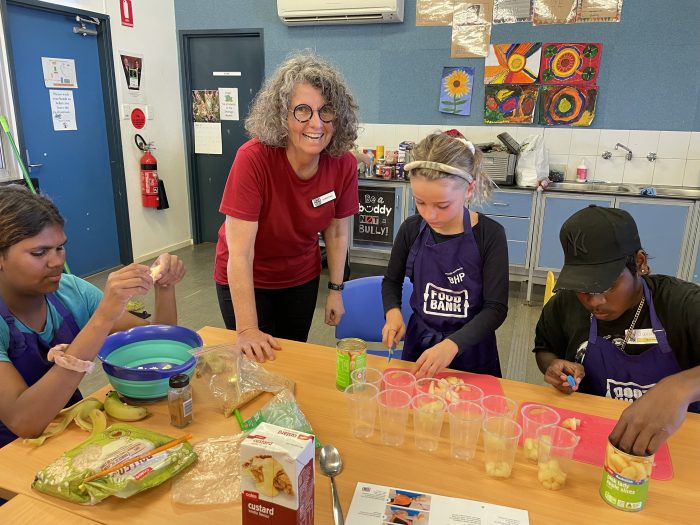Associate Professor Christina Pollard joins the “Purple Shirt Ladies” in the Pilbara
When the opportunity came up for Foodbank WA board member Associate Professor Christina Pollard to travel to remote Pilbara communities with our team, she jumped at the chance. Seeing what we do firsthand is essential to the Board members’ understanding of the complexities of our work, and for Christina it perfectly aligned with her work as an advocate for food security in our vulnerable populations.
Christina is the Director of both the Public Health Advocacy Institute and Mentally Healthy W.A. Prior to her work with Curtin University, she spent over 30 years in government developing, implementing, and evaluating public health nutrition interventions including the Gofor2&5© fruit and vegetable campaign. Christina joined our Board to advocate for population groups vulnerable to diet-related health conditions, particularly remote Indigenous communities.
“It was a privilege to participate in the trip and observe this well run and valuable program and to see how important and valuable it is to remote Indigenous communities. Food Sensations® has potential to support children and teachers in remote communities to improve food literacy, promote nutrition and reduce food insecurity. Essential for their health” Christina said.
Food Sensations nutrition education programs are offered to all schools taking part in our School Breakfast Program. Thanks to the support of BHP, children of all ages are given the opportunity to learn nutrition and basic cooking skills through fun, hands-on activities with nutritionists. Of the 460 participating schools, 109 are remotely located in areas classified as having the highest possible level of food stress.
There are many barriers to good health in remote areas. Small stores offer limited choices with very few nutritionally balanced foods and high prices. A comparison between remote stores and Woolworths in Newman, found prices were on average 30% higher and up to 287% higher for broccoli. Achieving the required “2 fruit & 5 veg” can be difficult, or impossible.
When good food is accessible, food insecurity is also affected by gaps in food literacy, the basic skills such as how to choose and select nutritious foods, plan and budget for meals, store food correctly, prepare meals and enjoy the social aspect of eating. Foodbank WA’s Food Sensations programs develops these essential skills.
“Because Foodbank WA has been visiting these communities for 11 years, we have built strong relationships with the communities. The children remember the team and what they have learned in previous years. Although we only visit these remote communities once a year, they remember the team. It’s so it’s nice to see how excited people are when the “purple shirt ladies arrive.” said Christina.
Aboriginal and Islander Education Officer and Language Teacher Lucelle Francis has been teaching for three years in the community and describes the impact of the Food Sensations program.
“As the kids grow, every year they’re stepping up and continue to cook with you and learning new recipes which they’ll cook when they get older. They’ll use those skills with the knives. That’s very important.”
We drive many hours on rough dirt roads to reach remote communities. The visits can also be a bumpy ride emotionally, as we witness both beauty and struggle side by side. Christina recorded her observations after spending the day in the communities.
“The children were happy and keen to be at school. Many of them appeared to live in the gym or the lean-to opposite the school. The school was not separate from the teachers’ families’ house or where the families slept. The teachers took food to hand to the parents in the area where they sleep. We talked with the teachers about the complex issues the children and their families face.”
Thanks to the generous support of BHP, we visit these communities every year. Christina shared in the joy of seeing the learning carried through between visits.
“One of the little girls (7 years old) remembered a lot of our Superhero Foods®. We were surprised, because sometimes it takes a while for the concept to stick for the really young ones.”
Lucelle Frances has watched the children she teaches every day make incremental improvements in knowledge, so they can make informed food choices, grow positive attitudes to healthy foods and engage socially with healthy affordable meals. These changes help improve their food security, now and into the future.
“They’re learning cooking skills and nutrition, how to eat healthy and giving them skills for life as they grow older and cook for themselves and their families,” said Lucelle.
 Contact us
Contact us Log in
Log in
